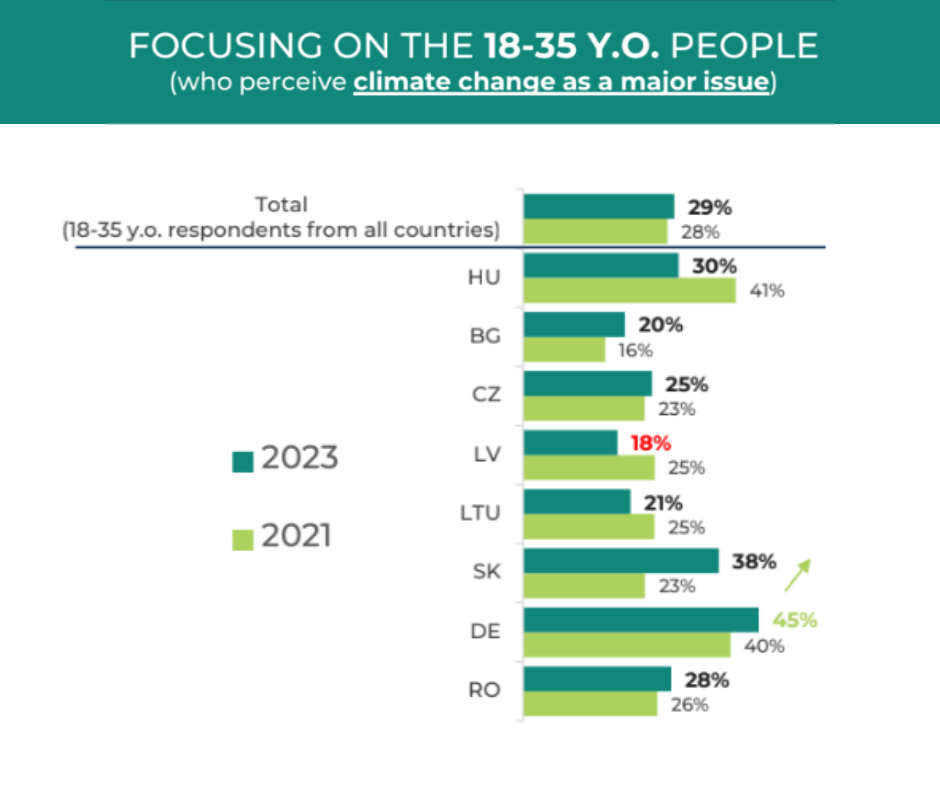Probably you have heard about the Jane Godall Barbie doll, as the famous conservationist was honored with recycled plastic Barbie doll. She said, “girls don't want just to be film stars and things like that; but many of them, like me, want to be out in nature studying animals.” Hopefully.
The future of our planet is in young people’s hands and young people are always in the focus of Game On projects. Young people are increasingly worried about the future of the planet, but increasingly feel they can do something about it. That’s what we found in our study, between October-November 2021 and May-June 2023. The research was conducted in 8 countries: Bulgaria, Czech Republic, Germany, Hungary, Latvia, Lithuania, Romania and Slovakia interviewing people through online focus group discussions.
We planned to conduct a second survey in 2023 with the cooperation of CEEWeb, our lead partner organization, focusing on how climate change impacts all life on Earth and how our choices affect the ecosystems in order to capitalize on the strong synergies in an emotional, life-centered communication campaign. The evaluation of the survey was compared with the results of the 2021 survey to see how the understanding of the public, and especially the young (18-35 years old) generation, has changed after about one and a half years. The aim of the ‘Game Over?’ project is to support the multi-dimensional and cross-country campaign of CEEWEb for Biodiversity with identifying the most appropriate messages and channels for communication actions.
Our research made with the cooperation with CEEweb for Biodiversity shows that in 2023 young people feel less optimistic and hopeful, (comparing with 2021 in the study) and some of them have even become passive and discouraged by the fact that no major actions and developments were seen in the past two years, and the whole topic is now neglected, pushed into the background by other topics and issues. No wonder, it’s easy to sink into eco-anxiety. Previous studies have proven that this distress is heightened in the younger generation and our research confirms this. But it also suggests that young people believe in their own power to make a difference.

We were focusing on the 18-35 y.o. people who perceive climate change as a major issue, we found that 29% think that climate change is truly a major issue. (in 2021 28%) The question we asked them was the following: “What would you say, what are the 3 biggest issues you and your family are facing today? Please select the 3 most important issues from the list below.”
We found a significant increase in the proportion of 18–35-year-olds in Slovakia who consider climate change to be one of the most important problems of our time, while Latvia and Hungary show a larger decrease in this age group compared to the 2021 results. We asked the participants about the reason for their skepticism. Here are some answers.
‘Lately it is only us, individuals who care, from the big politics it has disappeared...before I could see some improvement, but now I do not.’ (HU, male, 37)
‘I am more pessimistic than I used to be, I think half a billion people are trying while the other 7 billion is doing nothing to stop it.’ (CZ, male, 35)
‘If we wanted to do something about it, it would need an attitude change, starting mainly with ourselves, but it would also have to be followed up by a change in humanity's priorities, which is certainly not easy, and I don't think it is realistic.’ (SK, female, 35)
‘...theoretically every country, every government would have to start changing things, and we're not talking about little things like these crappy plastic lids, that really doesn't matter, but about things like marine pollution, the way energy is produced, that kind of thing. I think it's clear to everyone that that's where it has to start.’ (GER, female, 18)
Differences between countries
There is no gender difference on this question in most countries in 2023, the only exception being Slovakia, where men rather than women think climate change is one of the biggest issues today (51% vs. 26%). Apart from Germany, the proportion of people in all the countries surveyed who consider climate change to be a real, global problem has stagnated or even fallen - but Hungary is still the best performer.

- How do women and men feel about climate change?
- What actions do we need to do against climate change?
- How big is the problem?
- Who is responsible?
- And how we can raise awareness and what is the role of the media?
Those are the questions we discuss further in our blog series. If you want to know when the new blog article will be published, or get more news about the topic sign up to our newsletter here.
If you are interested in the whole survey, you can find it here.



